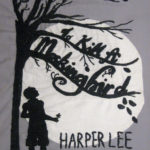12 Mar Harper Lee’s Last Will Released by Alabama Court
 An Alabama court unsealed author Harper Lee’s last will and testament in February, according to this New York Times article. Lee’s will was previously private thanks to her long-time lawyer, Tonja B. Carter. Carter, the executor of Lee’s estate, went to court in 2016 to have the will sealed because of privacy concerns. This was an usual legal move because wills are filed in probate, which makes them accessible to the public. The New York Times’ lawyers pointed this out in the lawsuit they filed to access the document. The estate withdrew its opposition a few weeks ago, and the document became accessible to the public.
An Alabama court unsealed author Harper Lee’s last will and testament in February, according to this New York Times article. Lee’s will was previously private thanks to her long-time lawyer, Tonja B. Carter. Carter, the executor of Lee’s estate, went to court in 2016 to have the will sealed because of privacy concerns. This was an usual legal move because wills are filed in probate, which makes them accessible to the public. The New York Times’ lawyers pointed this out in the lawsuit they filed to access the document. The estate withdrew its opposition a few weeks ago, and the document became accessible to the public.
Unfortunately, Lee’s will didn’t reveal much about who got what since the majority of her assets were transferred into a trust she formed in 2011. Trust documents are private, so unlike Lee’s will, a case cannot be made to have it unsealed. Many questions have been raised about the privacy-loving author, such as who received her literary works when she died? Why did she wait so long to publish her second book about the Finch family? Was she competent when she signed her revised will eight days before she died? Answers were not found in her will, but here is what is known about the world renowned author:
Who was Harper Lee? An Overview
Harper Lee was a Pulitzer prize-winning author. Her first published novel, “To Kill a Mockingbird”, highlighted racial prejudices in the South. It was a huge hit and is still read today. In fact, more than 40 million copies of the novel have been sold, and it is still taught in schools. After her initial success, Lee stayed dormant as a writer for years. Her second novel, “Go Set a Watchman”, a sequel to her first, wasn’t published until 2015. Lee never married or had children. She died in her sleep at the age of eighty-nine on February 19, 2016.
Publishing Controversies Surrounding Lee
Lee was in the middle of a variety of publishing controversies throughout her life. One of the main conflicts arouse between Lee and her childhood friend, Truman Capote. Lee helped Capote write “In Cold Blood”, a novel about the Clutter family murders in Holcomb, Kansas. Capote included Lee in the book’s dedication, but didn’t credit her for her work on the book. This led to hurt feelings, though the two remained friends for life. Another controversy surrounding Lee relates to a lawsuit she filed in 2013 against Samuel Pinkus, a literary agent. Lee said in 2007 that Pinkus attempted to “dupe” her out of royalties for “To Kill a Mockingbird”. The parties reached a settlement in 2013. Finally, and perhaps most famously, controversy arouse out of the publication of Lee’s second novel, “Go Set a Watchman”.
Lee actually wrote “Go Set a Watchman” before “To Kill a Mockingbird”, but was asked to rewrite the novel by her publisher. This is how “To Kill a Mockingbird” came to be. Years passed and “Go Set a Watchman” was thought to be lost, but was discovered in a safe deposit box by Carter, Lee’s aforementioned lawyer. HarperCollins announced the book would be published on July 14, 2015, but many questioned the decision because Lee’s health was declining. In response to the questions, Lee said through Carter that she was “alive and kicking and happy as hell with the reactions” to the announcement. However, Lee’s reassurance didn’t put an end to doubts, especially because her sister, Alice, wrote a letter claiming Lee “would sign anything put before her.” Alabama officials did investigate the case and found no evidence that Lee was coerced. “Go Set a Watchman” was published as planned.
Honors and Awards
Besides receiving a Pulitzer prize for her work, Lee was also awarded the Presidential Medal of Freedom by George W. Bush in 2007.
To contact Boyum Law Firm for help with estate planning documents, click here.



